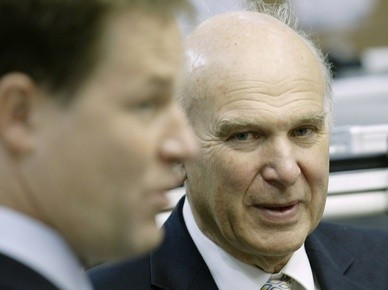Lib Dem Conference: Nick Clegg Struts, Vince Cable Stings
Liberal Democrat leader Nick Clegg wins crucial conference vote on economy after minister Vince Cable falls in line. But both strengthened their positions

It is one of the basic rules of party politics, only pick a fight with your own members if you are sure you are going to win it. And it goes double if the fight is to be in the full glare of a party conference.
So it should have come as no surprise to anyone that, when Liberal Democrat leader Nick Clegg decided to face down his party activists over economic policy, he was pretty confident he was going to emerge victorious.
He even managed to persuade his Treasury minister Vince Cable to fall in line, sort of, and not only turn up for the crucial conference debate but to actually vote for him. So what was all the fuss about?
The fact that Clegg's side were happy to see this debate hyped up into an issue of leadership credibility offers the answer.
It was indeed about underpinning his leadership and his unswerving support for Chancellor George Osborne's so-called austerity economic programme.
And by ensuring the delegates saw it as a leadership issue, it helped secure victory. Virtually nobody in the party is really up for a leadership challenge now, and probably not before the next election.
But it was also about showing the real world outside the Glasgow conference centre that, not only is Clegg firmly in control of his troops, but that those troops are far more happy to stick with his position inside the coalition government than much of the pre-conference speculation had suggested.
Perhaps the surprising thing is that the conference abandoned its old habit of proudly embarrassing its leaders, because it proves how democratic they are, in favour of a show of unity and "responsibility". Another bonus for Clegg.
Barring any unforeseen bear traps over the next few days and assuming he delivers a powerful, crowd-pleasing speech on Thursday, which is a pretty safe bet, Nick Clegg will emerge at the end of this conference as secure in his leadership as he has ever been.
But what about the man everyone had been encouraged, by his own side, to believe was ready to publicly disagree over economic policy, snub his leader's speech and even vote against him.
In the end Cable relented and watched Clegg's speech from the conference floor and duly voted for his motion.
Ugly Tories
But none of this should hide the fact that there was something else going on in Glasgow - political positioning. All the fuss around Cable's appearance underpinned his role as the second-most-important-man-at-conference and, even though he did turn up, he had already ensured plenty of coverage for his own position.
And, while he may well have seen the dangers inherent in appearing to publicly disagree with his boss after he turned it into a leadership test, he still managed to drop a line or two into his speech betraying his hesitation over some of the claims being made for the recovery which Clegg is happier to endorse.
In among all the fiery assaults on the "ugly" Tories he declared: "We must not settle for a short term of growth fuelled by an old fashioned property boom."
Mr Cable accused the Conservatives of "callous" behaviour towards immigrants, unions and benefit claimants.
He renewed his warnings that government policies will lead to a housing boom, saying there was a risk that a "short term spurt" of growth was being prioritised over the long-term security of the economy.
He said: "We must not now settle for a short term spurt of growth fuelled by old-fashioned property boom and bankers rediscovering their mojo. We've seen it all before. Already amber lights are flashing, warning us of history repeating itself."
That was not quite the full-on refusal to back Osborne's strategy, as had been flagged up, but it probably did enough to signal where he stands in relation to the two big parties. That is, leaning towards Labour.
And that is the undercurrent running throughout this conference, which hopes and believes that the 2015 election will see another hung parliament with their party once again being called on to forge a coalition with either Labour or the Tories.
If it is the Tories then Clegg is still probably their man. If it is Labour, as the majority of them would still clearly prefer, then Cable is the front runner to replace Clegg as part of those negotiations.
And nothing he did, or didn't do, at the conference has undermined his claim to that possible crown.
© Copyright IBTimes 2025. All rights reserved.





















